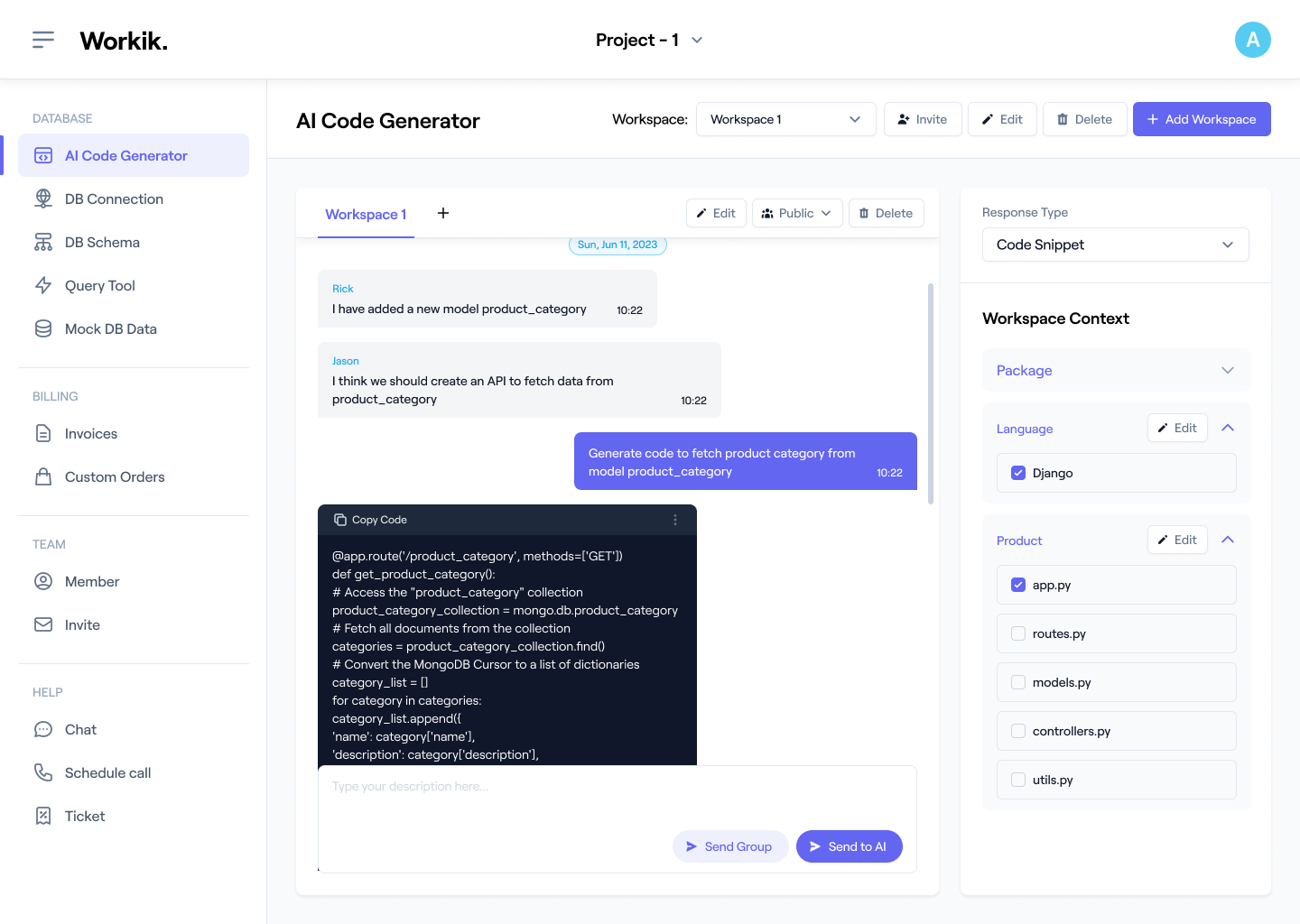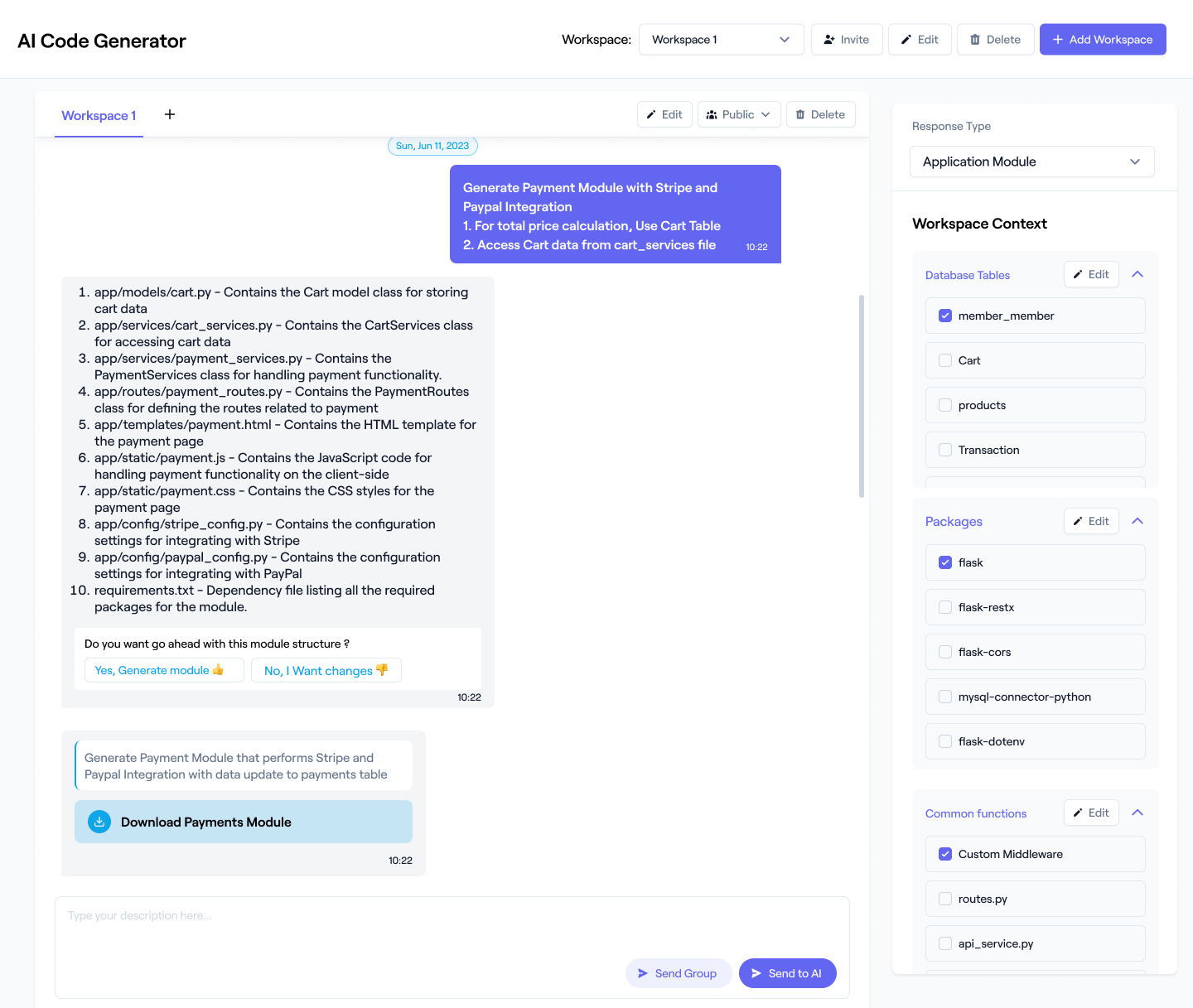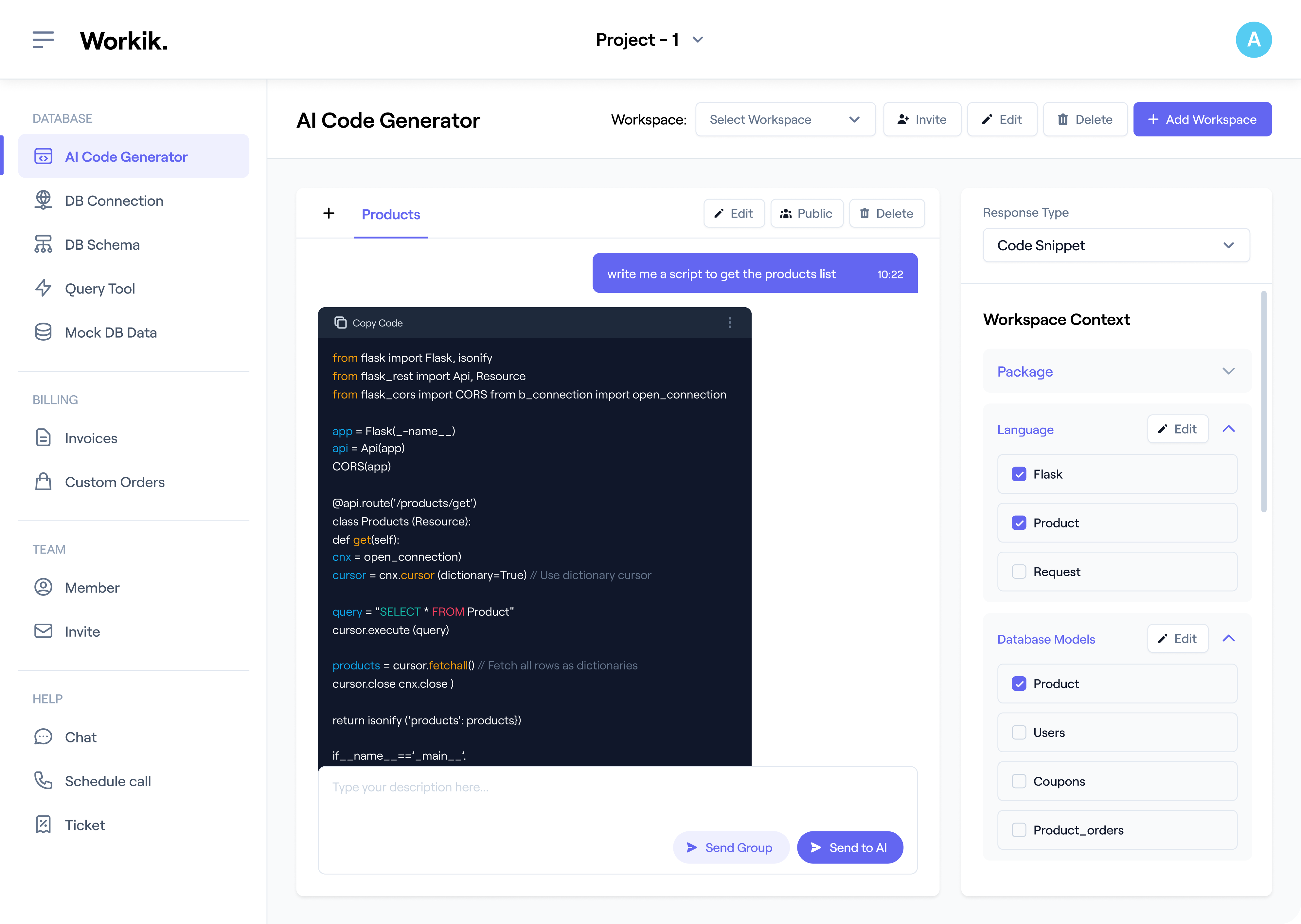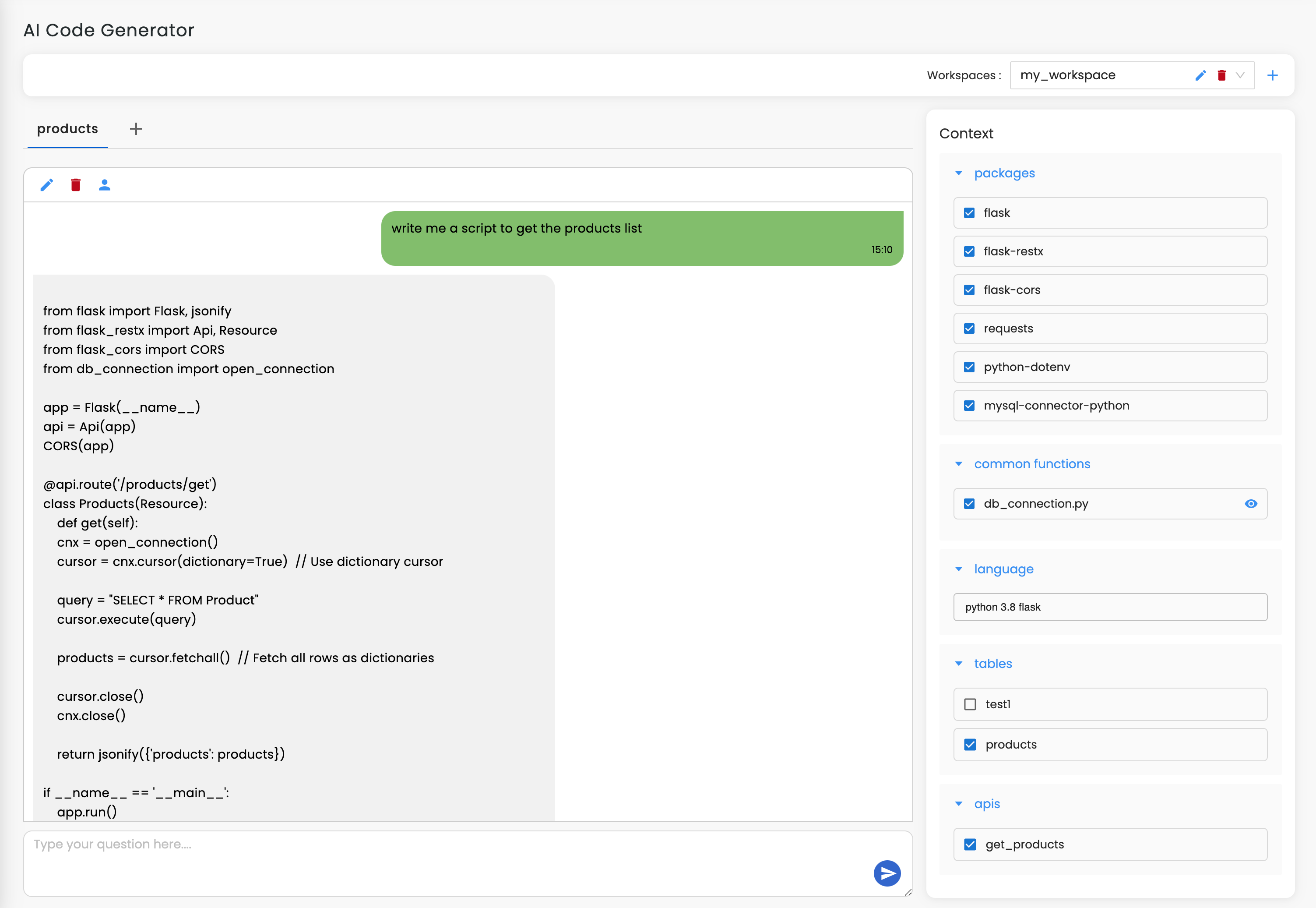
Join our community to see how developers are using Workik AI everyday.
Features

Easy Refactoring
AI refactors inefficient code structures, instantly optimizing loops, algorithms, and memory use.

Instant Code Migration
AI converts code seamlessly across all languages, handling syntax & logic for smooth transitions.

Error-Free Debugging
AI detects and fixes errors like null references & memory leaks, ensuring a stable, test-ready codebase.

Smart Framework Adaptation
AI transfers code between frameworks like Flask to Express or Spring to Django, adjusting routes, functions, and databases.
How it works
Easily sign up on Workik using Google or manually in just seconds, and jump straight into setting up your project.
Sync your code from GitHub, GitLab, or Bitbucket. Specify languages, frameworks, and project requirements to customize the AI conversion process for precise, context-driven output.
AI can assist in converting code across languages, adjusting syntax, logic, and data structures. It can also debug, test, and generate documentation, ensuring smooth transitions and optimal performance.
Invite team members on Workik and collaborate collectively using AI.


Expand


Expand


Expand


Expand


Expand


Expand


Expand


TESTIMONIALS
Real Stories, Real Results with Workik
Converted Python to Java for backend services with minimal tweaking. Workik made the transition seamless.

David Harper
Junior Developer
I easily transformed Swift code into Kotlin with Workik AI, speeding up cross-platform app development.

Marta Ramirez
Mobile Developer
Workik AI converted complex Node.js logic into C# efficiently. Great for building cross-language microservices.

Lucas Devereaux
Full Stack Developer
What are the popular use cases of the Workik AI Code Converter for developers?


Popular use cases of Workik AI Code Converter include but are not limited to:
* Code Migration: Seamlessly convert a project from Python to Node.js while maintaining logic and structure.
* API Adaptation: Translate REST API code from Java to Go, optimizing for different frameworks.
* Cross-Platform Development: Convert mobile app code from Swift to Kotlin for Android compatibility.
* Legacy Code Modernization: Update old PHP code to modern JavaScript frameworks like React or Angular.
* Performance Optimization: Convert low-level C++ code into more readable and maintainable Python scripts.
* Full-Stack Refactoring: Transition between front-end frameworks like Vue.js to React, or backend systems like Ruby on Rails to Django.
What contexts can I add to optimize Workik's AI-powered code conversion in Workik?


To enhance AI-powered code conversion, you can add any of the following context on Workik:
* Connect your GitHub, GitLab, or Bitbucket repositories to provide up-to-date codefiles.
* Specify source and target languages (e.g., Python to JavaScript).
* Define frameworks (e.g., Flask to Express.js).
* Provide context for libraries and dependencies (e.g., Pandas, Axios).
* Include your database schema for various databases like (MySQL, MS-SQL, PostgreSQL, MongoDB, etc).
* Share API documentation to ensure smooth API integration.
How does Workik AI handle differences in syntax between languages?


Workik AI analyzes and converts language-specific syntax, accurately translating loops, conditionals, and variable declarations. It adjusts the syntax to match the target language's requirements, avoiding issues like type mismatches or unsupported operations.
Can Workik AI convert complex applications with multiple layers (frontend, backend, database)?


Absolutely. Workik AI handles frontend frameworks, backend logic, and database migrations, ensuring smooth transitions across tech stacks like React to Angular or Flask to Django.
How is code readability maintained after conversion by Workik AI?


Workik AI ensures the converted code follows best practices for readability and maintainability, producing clean, well-structured syntax in line with modern coding standards.
What happens when a language-specific feature lacks a direct counterpart?


If a feature in the source language doesn't have an equivalent in the target language, Workik AI suggests alternatives or flags areas that may need manual adjustment.
Can't find answer you are looking for?
Request question

Request question
Please fill in the form below to submit your question.
Generate Code For Free

Code Conversion: Question & Answers
Code conversion refers to the process of translating code written in one programming language or framework into another, ensuring that the functionality and logic of the original code remain intact. This is essential for projects that need to migrate from one tech stack to another, maintain cross-platform compatibility, or modernize legacy systems.
Popular frameworks and libraries used in code conversion include:
1. JavaScript/TypeScript:
Babel (for ES6+ to ES5), TypeScript Compiler
2. Python:
2to3 (for Python 2 to 3), PyOxidizer (Python to Rust)
3. Java:
Retrolambda (Java 8 to older versions), ProGuard (Java bytecode conversion)
4. C++:
Clang (cross-language compilation), Emscripten (C++ to WebAssembly)
5. PHP:
Rector (automated refactoring), Phan (PHP5 to PHP7 conversion)
6. Ruby:
JRuby (Ruby to Java), YARV (Ruby to bytecode)
7. Swift/Kotlin:
Kotlin Multiplatform (for code sharing between platforms), Sourcery (Swift code generation)
Popular use cases of code conversion include:
1. Tech Stack Migration:
Moving a codebase from one language or framework to another, e.g., from Python to JavaScript.
2. Legacy Modernization:
Updating old code written in outdated languages or frameworks to modern counterparts.
3. Cross-Platform Compatibility:
Converting code for reuse across different platforms, e.g., Android to iOS.
4. Code Standardization:
Aligning codebases from various projects to a unified language or framework for consistency.
Career opportunities and technical roles available for professionals in Code Conversion include Software Engineer (SWE), DevOps Engineer, Migration Consultant, Full Stack Developer, Legacy System Modernization Specialist, Cloud Engineer, and API Integration Specialist.
Workik AI provides comprehensive support for code conversion, including:
1. Automatic Syntax Translation:
Converts code from one language to another, handling syntax differences efficiently.
2. Framework Mapping:
Adapts framework-specific functions and libraries during conversion, ensuring smooth transitions.
3. Debugging and Testing:
AI assists in debugging and testing the converted code, ensuring functionality and performance remain intact.
4. Code Optimization:
Refactors and optimizes the converted code to improve performance and maintainability.
5. API Translation:
Automatically converts API integrations and updates endpoints during the code conversion process.
Explore more on Workik
Get in touch
Don't miss any updates of our product.
© Workik Inc. 2026 All rights reserved.

